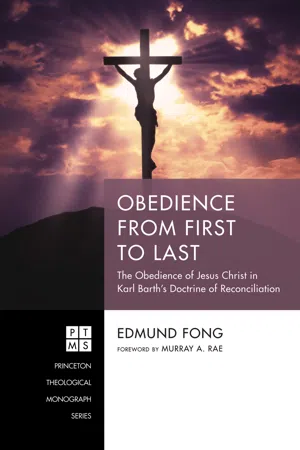
Obedience from First to Last
The Obedience of Jesus Christ in Karl Barth's Doctrine of Reconciliation
- 360 pages
- English
- ePUB (mobile friendly)
- Available on iOS & Android
Obedience from First to Last
The Obedience of Jesus Christ in Karl Barth's Doctrine of Reconciliation
About This Book
Obedience from First to Last explores the theological significance of the obedience of Jesus Christ in Karl Barth's theology. It does this via a threefold consideration of, first, the nature of Jesus' incarnate obedience; second, the relation of that obedience to the obedience of the second triune person of the eternal Son; and third, the effects Jesus' obedience has on our own obedience. Barth not only affirms the pivotal role Jesus' obedience has within the economy of salvation, but by equating that obedience with that of the eternal Son's, Barth gives Jesus' obedience a pre-eminent place within the immanent being of Godself. The obedience of Jesus Christ is seen to have a co-participatory role in God's determination of his own divine being that arises from the primordial act of divine election. This notion bears on our understanding of freedom and obedience: as divine freedom is expressed in divine obedience, so it is with human freedom and human obedience.
Frequently asked questions
Information
Table of contents
- Title Page
- Foreword
- Acknowledgments
- Abbreviations
- Introduction
- Chapter 1: The Divine Obedience of the Eternal Son in the Theology of Karl Barth
- Chapter 2: Divine Obedience and Trinitarian Ontology: Reading Karl Barth’s Actualistic Ontology in the Light of the Obedience of the Eternal Son
- Chapter 3: The Obedience of Jesus Christ in Karl Barth’s Christology in the Church Dogmatics
- Chapter 4: Karl Barth’s Reading of the Metaphysics of the Obedience of Jesus Christ
- Chapter 5: The Spirit in Relation to the Son’s Incarnate and Intra-Trinitarian Obedience to the Father
- Chapter 6: The Obedience of Jesus Christ in Barth’s Doctrine of the Atonement
- Chapter 7: “The Obedient One, Obedient in Our Place”: An Alternate Account of Barth’s Doctrine of the Atonement
- Chapter 8: “Freedom to Obey”: Relating Divine Freedom and Divine Obedience, and Human Freedom and Human Obedience
- Conclusion
- Bibliography